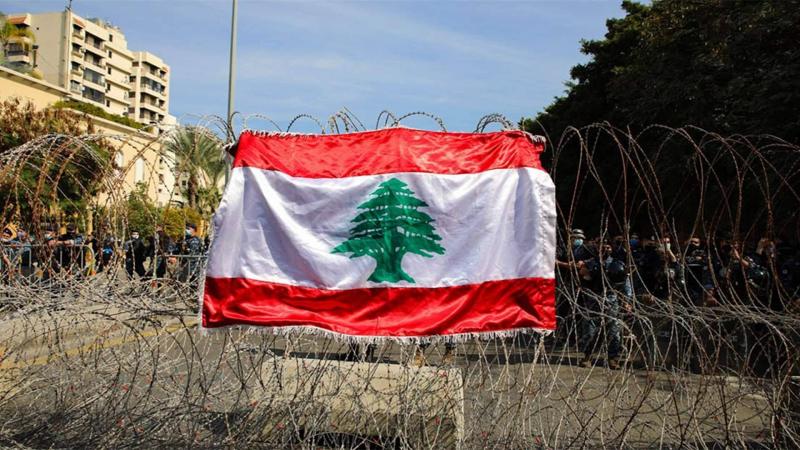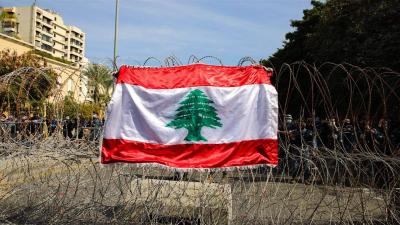Lebanese people are preparing to welcome the new year amid increasing fears that it may bring more crises, continuing the inherited issues from its predecessor which has only a few days left, unless signs of a breakthrough appear, which are not visible at this time. However, ministerial sources have begun to promote waves of optimism, betting on the return of French presidential envoy, former Foreign Minister Jean-Yves Le Drian, to Beirut in an attempt to establish a third option for electing a president, coinciding with the confirmation from Speaker of the Parliament Nabih Berri that his focus will be on the election once the holiday break is over in order to rescue the presidential duty from its deadlock.
Ministerial sources revealed to "Asharq Al-Awsat" that although Le Drian has committed to returning to Beirut next month, he is still hesitating to request appointments to meet parliamentary blocs to advance the presidential file, based on his preference for the third option, as is the case with the Qatari envoy.
The same sources also noted that influential official Lebanese parties are promoting the idea that the mediation carried out by Oman between the United States and Iran is still ongoing and has not stopped, despite the exchange of threats that have reached their peak, concerning ensuring freedom of navigation in the Red Sea. They stated that this situation might lead to a breakthrough that could provide hints toward a resolution of the Lebanese crisis due to Iran's influence in Lebanon, which it uses to protect its interests in the region while acknowledging its role.
However, opposition sources argued that it is too early to ride waves of optimism, which will remain contingent upon the situation in Gaza amid the ongoing war between Hamas and Israel, and the developments that may arise from its connection to the northern front in southern Lebanon as Hezbollah continues to support Hamas, with its activities escalating day by day. Therefore, the contrived promotion of optimism keeps Lebanon, as opposition sources told "Asharq Al-Awsat," on the waiting list, which could deepen the burdens of crises faced by the Lebanese, contrary to what ministerial sources claim, that this situation places Lebanon on the verge of a new phase, opening the door to restoring the functioning of its constitutional institutions, starting with the election of a president.
The opposition sources questioned the validity of the information circulating from various official sources regarding U.S. energy advisor Amos Hochstein's intention to head to Beirut in efforts to mediate between Lebanon and Israel to redefine land borders, completing his previous mission that led to the demarcation of maritime borders between the two countries.
Although high-ranking official sources in Lebanon have not confirmed a return date, several Lebanese politicians relayed, from U.S. Ambassador Dorothy Shea who is preparing to leave Lebanon, a confirmation of the U.S. envoy’s return to mediate at the request of President Joe Biden to define land borders between Lebanon and Israel, aimed at reaffirming the implementation of Resolution 1701 in anticipation of Israeli Prime Minister Benjamin Netanyahu potentially targeting southern Lebanon once the war in Gaza ends.
This willingness from Washington to assume a mediative role is reinforced by advice from several Western parties to the caretaker government, urging Hezbollah not to expand the confrontation along the northern front, or risk entering an all-out war as an extension of the current circle in Gaza. These parties warn, due to their concerns, that Netanyahu may single out Lebanon once the war in Gaza ends, and urge the government to prepare a plan regarding the implementation of Resolution 1701, as international conditions do not allow for its modification, with difficulties expected in reaching an alternative resolution. Thus, it is essential to create conditions for its reactivation so that the government can assert its authority in the south and prevent Hezbollah from unilaterally deciding on peace and war.
The question remains: How accurate are the claims circulating among some politicians, based on Ambassador Shea's remarks, that the U.S. envoy hinted during his last visit at his willingness to mediate to determine borders along the northern front between Lebanon and Israel, starting with resolving disputes over several points that the Lebanese government had previously reserved, demanding Israel to withdraw from these areas as part of the withdrawal line that has been pending since the issuance of Resolution 1701 at the end of the July 2006 war? This explains the lack of recognition by Lebanon of the Blue Line as a final border demarcation alternative to the comprehensive withdrawal line.
These sources convey that Shea mentioned the potential for finding a solution to the continued Israeli occupation of the Shebaa Farms, considering the possibility of expanding the mission of UNIFIL to include these areas along with Kfarshouba Hill and the Lebanese portion of Ghajar village. However, some view the U.S. offer as an attempt to pressure Hezbollah, which first demands a halt to Israeli aggression on Gaza, and overlooks what is termed the U.S. proposal, which, according to its sources, is seen as an attempt to create a rift between the party and Lebanese factions that do not agree with its approach to the heated situation in the south, based on the notion that Hezbollah does not oppose its implementation.
Thus, it is necessary to inquire about the position of the caretaker government and the validity of claims that it is preparing a comprehensive plan under the banner of its commitment to Resolution 1701 and holding Israel accountable for obstructing its implementation.
In light of everything being promoted by some about waves of optimism lacking supporting evidence, the primary concern for the government currently, as stated by ministerial sources, lies in completing the filling of vacancies in the military council, which will take its course with implementation, as communicated by its head, Najib Mikati, in the first session of the cabinet once the holiday break concludes.
A notable new development may be in forming the Internal Security Forces Leadership Council, which has long expired, and disagreements have prevented its separation from political wrangling, to be established by issuing an ordinary decree signed by Mikati, along with the ministers of interior and finance, unless Mikati sees fit to issue it through the cabinet as he stands in for the president in his absence, who is expected to sign the decree before it is published in the official journal to become effective.




